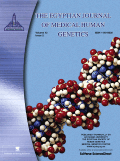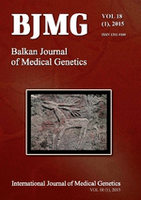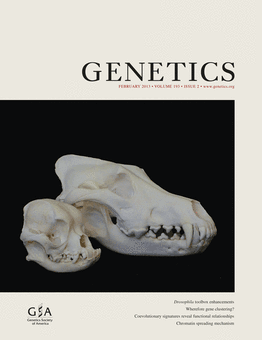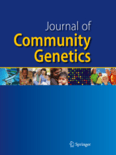
AMERICAN JOURNAL OF MEDICAL GENETICS PART A
Scope & Guideline
Empowering Researchers in Medical Genetics
Introduction
Aims and Scopes
- Genetic Disorders and Syndromes:
The journal covers a wide range of genetic disorders, including but not limited to chromosomal abnormalities, single-gene disorders, and multifactorial conditions. It focuses on the clinical, molecular, and genetic aspects of these disorders. - Clinical Genetics and Genetic Counseling:
It emphasizes the importance of genetic counseling and clinical genetics in managing inherited conditions, highlighting the need for effective communication of genetic information to patients and families. - Phenotype-Genotype Correlations:
The journal explores the relationship between genetic variations and phenotypic outcomes, providing insights into how specific genetic mutations can lead to particular clinical features. - Advancements in Genetic Testing:
Research on the latest advancements in genetic testing technologies, including next-generation sequencing and their applications in clinical settings, is a central theme. - Ethical, Legal, and Social Implications:
It addresses the ethical considerations surrounding genetic testing and counseling, including patient privacy, consent, and the implications of genetic information on individuals and families. - Multidisciplinary Approaches to Genetic Disorders:
The journal promotes the integration of knowledge from various fields, including pediatrics, neurology, oncology, and other specialties, to enhance the understanding and management of genetic disorders.
Trending and Emerging
- Integrative Genomic Medicine:
There is a growing trend towards integrative approaches that combine genomic data with clinical information to enhance diagnosis and treatment strategies for genetic disorders. - Neurodevelopmental Disorders:
Research focusing on neurodevelopmental disorders, particularly those with complex genetic underpinnings, is increasingly prominent, reflecting heightened interest in understanding autism spectrum disorders and related conditions. - Ethical and Social Implications of Genetic Testing:
The journal is seeing more articles addressing the ethical, legal, and social implications of genetic testing, particularly in the context of direct-to-consumer testing and the responsibilities of healthcare professionals. - Genetic Contributions to Common Diseases:
There is a rising interest in exploring the genetic contributions to common diseases, including multifactorial disorders, as researchers aim to elucidate the complex interactions between genetics and environmental factors. - Innovations in Gene Therapy:
Research articles detailing advancements in gene therapy and its applications for treating various genetic disorders are increasingly featured, showcasing the potential of innovative therapeutic strategies. - Longitudinal Studies on Genetic Conditions:
An emerging trend is the publication of longitudinal studies that track the progression of genetic disorders over time, providing valuable insights into their natural history and management.
Declining or Waning
- Traditional Cytogenetics:
There is a noticeable decrease in publications focusing solely on traditional cytogenetic techniques, such as karyotyping, as advancements in genomic technologies like next-generation sequencing have taken precedence. - General Genetic Education:
Articles dedicated to general genetic education for healthcare providers are becoming less frequent, as the field shifts towards more specialized and targeted genetic education. - Case Reports of Common Genetic Disorders:
As the journal increasingly emphasizes rare and complex genetic disorders, the publication of case reports on more common genetic conditions is waning. - Basic Genetic Research:
The focus on fundamental genetic research, such as the molecular biology of genes without direct clinical applications, is less prevalent compared to applied genetic research with immediate clinical implications. - Phenotypic Descriptions without Genetic Correlation:
There is a decline in articles that describe phenotypes without linking them to genetic findings, as the emphasis shifts towards genotype-phenotype correlations and molecular mechanisms.
Similar Journals

Egyptian Journal of Medical Human Genetics
Bridging the gap between genetics and clinical practice.The Egyptian Journal of Medical Human Genetics is a distinguished Open Access journal published by SPRINGER NATURE, dedicated to advancing the field of medical human genetics. With an ISSN of 1110-8630 and an E-ISSN of 2090-2441, this journal serves as a vital platform for researchers, professionals, and students who are committed to the exploration of genetic implications on human health. Since its inception in 2010, it has become a growing repository of knowledge, significantly contributing to the discourse in clinical genetics, despite currently being ranked in the Q4 quartile of its category in 2023. The journal embraces an open access model, ensuring widespread visibility and accessibility of published research, thereby fostering collaboration and innovation in the field. The journal is not only aimed at disseminating findings but also at encouraging the dialogue around genetic research developments, making it an essential resource for anyone interested in the nuances of genetics and its impact on medicine.

JOURNAL OF HUMAN GENETICS
Shaping the Future of Genetic StudiesWelcome to the Journal of Human Genetics, a premier publication in the field of human genetics, published by SpringerNature. With a commitment to sharing groundbreaking research, this journal has been at the forefront of genetic studies since its establishment in 1961, converging its focus in 1996 and continuing to evolve through 2024. It holds a respected Q2 ranking in both the Genetics and Clinical Genetics categories, reflecting its significant contribution to the scientific community. With a notable Scopus ranking of 23rd out of 99 in Clinical Genetics and 95th out of 347 in Genetics, the journal offers a platform for high-impact research that informs clinical practices and advances the understanding of genetic disorders. Operating under an open-access model, it ensures that findings are readily accessible to researchers, professionals, and students worldwide. Join us in exploring the complexities of human genetics and contribute to the ongoing discourse in this dynamic field.

Application of Clinical Genetics
Championing Open Access to Genetic DiscoveriesApplication of Clinical Genetics is a premier open-access journal published by Dove Medical Press Ltd., dedicated to advancing the field of clinical genetics since its inception in 2008. Based in New Zealand, this journal has established itself as a significant resource for researchers, clinicians, and students alike, contributing to the body of knowledge in both genetic medicine and clinical applications. With an impact factor reflecting its contributions to the field, the journal holds positions in the Q2 and Q3 quartiles of the 2023 Genetics categories, showcasing its relevance and scientific merit. Furthermore, it ranks #43 out of 99 in Clinical Genetics and #153 out of 347 in Biochemistry, Genetics, and Molecular Biology, indicating robust performance amongst its peers. The journal’s broad scope, encompassing various aspects of clinical genetics, ensures that it remains at the forefront of critical discussions, innovative research, and applications essential for the progression of personalized medicine. Researchers and professionals are encouraged to explore its openly accessible content that fosters collaboration and the sharing of knowledge in this dynamic and rapidly evolving field.

Balkan Journal of Medical Genetics
Empowering the global community through open access genetics research.Balkan Journal of Medical Genetics is an esteemed scientific publication dedicated to advancing research in the field of medical genetics. Established in 2000 and published by SCIENDO, the journal has embraced an Open Access model since 2007, ensuring that vital findings are readily accessible to researchers, healthcare professionals, and students worldwide. With an ISSN of 1311-0160 and an E-ISSN of 2199-5761, this journal serves as a platform for innovative studies and clinical findings, although it currently ranks in the lower quartiles within its categories according to the 2023 Scopus rankings. The journal's geographical roots in Macedonia reflect the region's commitment to contributing to the global understanding of genetics. By publishing high-quality research, the Balkan Journal of Medical Genetics aims to foster collaboration and knowledge exchange among scientists and healthcare providers, ultimately enhancing patient care and genetic research practices.

Molecular Genetics & Genomic Medicine
Pioneering research for a healthier tomorrow.Molecular Genetics & Genomic Medicine, published by WILEY, is an esteemed and open-access journal that has been a prominent source of knowledge in the fields of genetics and molecular biology since its establishment in 2013. With an ISSN of 2324-9269, it aims to provide a platform for the dissemination of novel findings and innovative research that pushes the boundaries of genomics and its clinical applications. The journal holds a Q3 categorization in Genetics, Clinical Genetics, and Molecular Biology, reflecting its growing influence in these disciplines, as evidenced by its Scopus rankings. Researchers, professionals, and students alike will find valuable insights and advancements in genomic medicine, making this journal an essential resource for those dedicated to the understanding and application of genetic and molecular research in healthcare. Located at 111 River St, Hoboken, NJ, Molecular Genetics & Genomic Medicine continues to foster a global dialogue within the scientific community, ensuring accessible knowledge for all.

GENETICS
Connecting Generations Through Genetic ResearchGENETICS, published by the Genetics Society of America, stands as a preeminent journal in the field of genetics, with a keen focus on advancing the understanding of genetic principles and their implications across various biological systems. Since its inception in 1945, the journal has played a pivotal role in disseminating groundbreaking research, maintaining a Q1 ranking in the genetics category as of 2023, positioning it among the top tier of academic publications. While access to the journal is not open, it continues to attract a global readership of researchers, professionals, and students eager to engage with high-quality, peer-reviewed articles that span both classical and contemporary genetics. With its publication history covering critical decades from 1945 to 2024, GENETICS is not just a repository of scientific knowledge but a vibrant forum for the exchange of ideas that drive the field forward. The journal’s commitment to excellence is demonstrated by its strategic coverage of pertinent topics, assuring its relevance for future generations of scholars.

INTERNATIONAL JOURNAL OF HUMAN GENETICS
Navigating the Complexities of Human GeneticsINTERNATIONAL JOURNAL OF HUMAN GENETICS is a distinguished publication dedicated to advancing knowledge in the fields of genetics and molecular biology. Published by KAMLA-RAJ ENTERPRISES, this journal explores critical developments and research findings from 2008 to 2016, though its coverage in Scopus has since been discontinued. With an ISSN of 0972-3757 and an E-ISSN of 2456-6330, the journal aimed to foster scholarly dialogue and serve as a resource for researchers, professionals, and students engaged in human genetics. While the journal holds a modest ranking in categories such as Biochemistry and Genetics, it remains a vital source for exploring niche topics within the realm of human genetics. Researchers interested in genetic screening, gene therapy, and clinical genetics will find valuable insights herein. Despite its pause in indexing, the journal continues to contribute to the academic discourse by disseminating critical research that bridges gaps in understanding human genetics.

HUMAN GENETICS
Pioneering insights into human health and disease.HUMAN GENETICS, published by SPRINGER, stands as a cornerstone journal in the field of genetics, offering a wealth of research insights since its inception in 1964. Hailing from Germany, this esteemed journal boasts an impressive Q1 ranking in both Genetics and Clinical Genetics, marking it among the top quartile of journals in these categories for 2023. With a notable Scopus rank of #7 in Clinical Genetics and a percentile ranking of 93, HUMAN GENETICS attracts significant attention from researchers and professionals dedicated to advancing our understanding of genetic influences on human health and disease. Although it does not currently offer Open Access options, the journal provides a critical platform for scholarly communication, aimed at disseminating groundbreaking findings in genetics and biotechnology. As the field evolves, HUMAN GENETICS continues to play an instrumental role in bridging the gap between laboratory research and clinical application, making it an essential resource for students and seasoned researchers alike.

NEUROGENETICS
Advancing Insights at the Crossroads of Genetics and NeuroscienceNEUROGENETICS is a distinguished journal published by SPRINGER, focusing on the intersection of genetics and neuroscience. With its ISSN 1364-6745 and E-ISSN 1364-6753, this journal has been a vital resource in the fields of cellular and molecular neuroscience and genetics since its establishment in 1997. As of 2023, it is ranked Q3 in Cellular and Molecular Neuroscience and Q2 in both Genetics and Clinical Genetics, reflecting its growing influence and importance in these areas. Although not an open-access journal, it provides significant insights and research findings that contribute to advancing our understanding of genetic influences on neural function and disease. Based in Germany with an address at ONE NEW YORK PLAZA, SUITE 4600 , NEW YORK, NY 10004, UNITED STATES, NEUROGENETICS serves as a crucial platform for researchers, professionals, and students alike to explore innovative studies that are essential for the future of neuroscience and genetics. With its continuous commitment to high-quality research, the journal aims to foster collaboration and knowledge dissemination among the scientific community.

Journal of Community Genetics
Pioneering research for a genetically informed society.The Journal of Community Genetics, published by SPRINGER HEIDELBERG, is an influential Open Access journal dedicated to advancing the field of genetics in community settings. Since its inception in 2000, this journal has provided a platform for comprehensive interdisciplinary research that encompasses the critical intersections of genetics, public health, and epidemiology. Situated in Germany, the journal has positioned itself prominently within the academic community, evidenced by its 2023 impact rankings, which place it in the Q3 category for both Epidemiology and Genetics (clinical) and Q2 for Public Health, Environmental and Occupational Health. With an expanding scope that includes innovative research from 2010 to 2024, the journal aims to foster dialogue among researchers, healthcare professionals, and policymakers, ultimately driving advancements in community health genetics. The open access model ensures that this vital information is readily available to a global audience, reinforcing its commitment to public health improvement and genetic literacy.